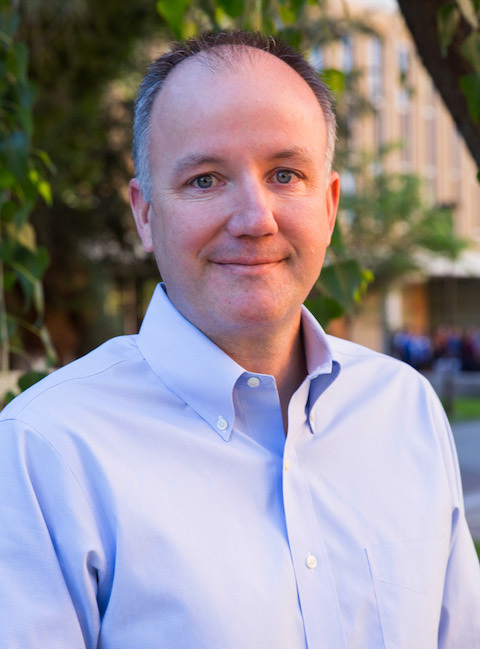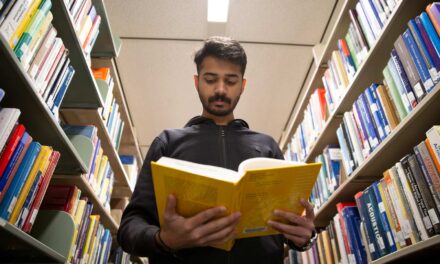
Peak performance in variety of roles brings prestigious professorial honor

His ideas are transformational . . . and he’s never satisfied with small, incremental advances in knowledge,” says a colleague of new ASU Regents’ Professor Paul Westerhoff. “Because of his persistence and dedication, Paul’s work will always be on the cutting edge.” Photographer: Jessica Hochreiter.
Paul Westerhoff figures he was “destined to be an engineer.” But that is mostly because while growing up, he jokes, “I just didn’t know anything else existed.”
His father was an environmental engineer. One of his two older brothers became an electrical engineer, the other a mechanical engineer. It just seemed natural for him to follow in the family footsteps.
Still, Westerhoff took his time in college before declaring a major. The only thing he was decided on was that “I wanted to do work involved with things outside.”
He liked the outdoors and gravitated toward “doing things around water,” specifically lakes, streams and rivers.
It was a course in hydrology — the study of water in the environment —that finally fixed him onto a specific educational track.
“It was the first time I had a class that really integrated my interests in mathematics, statistics and technology, and the teacher talked about how all that could relate to rivers,” Westerhoff recalls. “Everything just came together for me at that point.”
Recognized as outstanding research leader
The water thing has worked out well for him. Westerhoff, a professor of civil, environmental and sustainable engineering in Arizona State University’s Ira A. Fulton Schools of Engineering, is today a well-recognized leader in water treatment and water safety research.
He has received many of the most highly regarded awards for his work in the field, and his more than 200 peer-reviewed journal publications have made him among the most highly cited researchers in environment and ecology studies.
He directs a U.S. Environmental Protection Agency research network that teams nine universities to study the lifecycles of nanomaterials and their impacts on the environment and human health.
He is deputy director of the National Science Foundation Engineering Research Center on Nanotechnology Enabled Water Treatment. The center is developing technologies to provide clean water to millions of people in areas throughout the United States that still lack it.
Taking on challenging new roles
During his 22 years at ASU, he has also received accolades for his skills as a teacher, mentor and administrator.
Westerhoff has garnered awards for his work mentoring doctoral students and teaching undergraduates, and has been instrumental in helping to establish the Fulton Schools’ graduate and undergraduate degree programs in environmental engineering.
He has also served at various times as a civil and environmental department chair, the founding director of the School of Sustainable Engineering and the Built Environment, the Fulton Schools Associate Dean for Research, the ASU Vice Provost for Academic Research Programming, and Senior Advisor on Science and Engineering to the ASU Provost.
In 2016 the Fulton Schools created a new position and he was named the interim Vice Dean of Research and Innovation.
Why take on the extra administrative tasks on top of his research and teaching?
“I just get bored,” he says,” “and I need to be intellectually challenged.”
Colleagues confirm value of his work
With or without boredom as motivation, Westerhoff’s range of achievements has now earned him designation as a Regents’ Professor, the highest honor bestowed on faculty members at Arizona’s three state universities.
The title recognizes accomplishments in research, education, scholarship, creative endeavors and public service that have brought national and international distinction.
Colleagues attest to the widespread impact of Westerhoff’s contributions.
“His research is highly relevant to society because insufficient access to clean water is a major limiting factor to human capacity,” says Pedro J. Alvarez, the George R. Brown Professor of Civil and Environmental Engineering at Rice University and director of the Nanotechnology Enabled Water Treatment research center.
“Paul excels in scientific rigor. He does a great job of bridging the interface between the discovery-driven culture of science and the innovation-driven culture of engineering,” Alvarez adds. “It’s rare to find someone with such depth and breadth in issues related to water treatment.”
Menachem Elimelech, the Roberto Goizueta Professor at Yale University, points in particular to Westerhoff’s essential work exploring the environmental implications and applications of engineering nanomaterials as only one of his “numerous important contributions to the field of environmental engineering.”
University of Colorado Boulder Professor of Environmental Engineering R. Scott Summers sums up, “There are only a few who are able to visualize solutions to major challenges, and fewer still who can clearly articulate those solutions. Paul has that gift.”
“Paul’s research is never ordinary,” says Clemson University’s Vice President of Research Tanju Karanfil. “He’s always looking for solutions to environmental problems that are out of the box, and he’s never satisfied with small, incremental advances in knowledge. His ideas are transformational, which is exactly what our field needs. Because of his persistence and dedication, Paul’s work will always be on the cutting edge.”
Focus in innovation and entrepreneurship
Westerhoff doesn’t view his new Regents’ Professor status as a platform for shining a spotlight on career success. He hopes only that it might in some way boost his ability to make further impacts in the professional endeavors he cares about most.
In his new vice dean position, he wants to foster a stronger innovation mindset among the Fulton Schools’ 300-plus tenure-track faculty.
That involves them zeroing in more directly on use-inspired research pursuits with entrepreneurial potential.
“It’s the idea that progress isn’t just publishing in research journals, but in getting patents or starting a company,” he explains. “That might mean focusing on producing results that could have important concrete benefits rather than just finding out more about something that is merely interesting.”
“Paul is very creative and has a tremendous skill for identifying timely, relevant and interesting challenges,” says Julie Beth Zimmerman, an associate professor of chemical and environmental engineering at Yale University. “Not only is he adept at getting others to join the cause, he has a powerful gift in bringing out the best in those individuals, and even more importantly, realizing outcomes greater than the sum of the individual collaborators.”
Westerhoff is leading by example on the entrepreneurship front. He and his wife, Kelly, also an engineer (they met in graduate school), are forming a start-up that would license some of the water-treatment technologies he has developed and move them toward commercialization.
“I am manager and technical advisor,” he says. “She is the company president.”
Using his expertise to help communities
He also wants to continue using his expertise to help communities through his work as a member of an EPA science advisory board, as well as with the information and advice he has been providing to local governments and public groups that have been regularly seeking his consultation for more than a decade.
He has been participating in efforts to find water treatment, safety and pollution solutions for a number of sizable municipalities and urban regions, including Los Angeles, as well as for rural agricultural and ranching areas.
“It’s really interesting to help bring science and engineering experience into the mix of making public policy, and to see it come together toward something positive,” he says.
Urging students to broaden their horizons
With all of this multifaceted work on his agenda, Westerhoff still keeps teaching and mentorship high among his priorities.
He says one of best rewards of his job is watching the young undergraduates he teaches transition “from looking clueless and confused to starting to figure things out, to finally mastering complex concepts and ideas.”
With the advanced students, he likes pushing them to excel beyond the classroom — urging them to compete for scholarships, learn how to pitch themselves to employers, map out their career-planning strategies and develop their own research pursuits and their own creative approaches to problem solving.
Westerhoff’s measure of success in his role as an educator and research director is a simple one: “It’s when I’m learning as much from the students as they’re learning from me.”



































